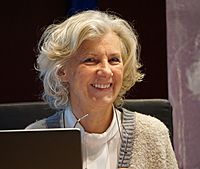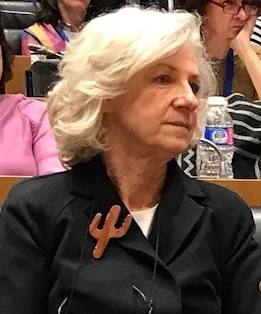Mercedes Bengoechea facts for kids
Quick facts for kids
Mercedes Bengoechea
|
|
|---|---|

Mercedes Bengoechea in Córdoba, 2017
|
|
| Born |
Mercedes Bengoechea Bartolomé
December 29, 1952 Madrid, Spain
|
| Alma mater | Complutense University of Madrid |
| Occupation |
|
| Known for | Feminist sociolinguist |
| Awards |
|
| Scientific career | |
| Institutions | University of Alcalá |
Mercedes Bengoechea Bartolomé (born December 29, 1952) is a Spanish professor and sociolinguist. A sociolinguist is someone who studies how language affects society. She is known for her work in feminism and for supporting the use of gender-neutral language.
For many years, she has given advice to important groups in Spain. These include the Institute of Women and the group that oversees Spain's public television and radio. She believes it is important to use language that is fair to everyone and does not leave anyone out. She has received several awards for her important research and new ideas.
Contents
Early Life and Education
Mercedes Bengoechea was born in Madrid, Spain. She studied Modern Languages at the Complutense University of Madrid and graduated in 1978. She later earned her Ph.D. in 1991.
Today, she is a professor of English philology (the study of the English language) at the University of Alcalá. She was also the dean of the Faculty of Philosophy and Letters there from 2003 to 2008.
Working for Fairer Language
Since 1994, Bengoechea has been part of a special group at the Institute of Women that advises on language. This group is called NOMBRA. She has also worked with Spain's Ministry of Justice to help make legal language easier for everyone to understand.
Bengoechea believes that the words we use are very powerful. She argues that language should be non-sexist. This means using words that include everyone, regardless of gender. For example, instead of using a word that only refers to men when talking about a group of people, we can choose words that are neutral or include everyone. She has continued to support this idea, even when powerful groups like the Royal Spanish Academy have disagreed.
She also helped coordinate the first yearly report for the National Observatory on Gender Violence. This group studies and reports on violence related to gender.
Awards and Recognition
Mercedes Bengoechea has been honored with several awards for her work.
- 1993: She won the María Isidra de Guzmán Research Award for her book about the writer Adrienne Rich.
- 2006: She received the Dones Progressistes Award for her research on gender and language.
- 2008: She won the Award for Innovation in Non-Sexist Communication. This was for a project called Nombra.en.red, which she created with José Simón.
- 2011: She was awarded the First Class Distinguished Cross of the Order of Saint Raymond of Peñafort by Spain's Ministry of Justice for her contributions.
Selected Books
Mercedes Bengoechea has written many books and articles about language. Here are a few of her works:
- Lengua y género (Language and Gender), 2015
- Efectos de las políticas lingüistas anti-sexistas y feminización del lenguaje (Effects of Anti-Sexist Language Policies and the Feminization of Language), 2009
- Lo femenino y lo masculino en el Diccionario de la Real Academia Española (The Feminine and the Masculine in the Dictionary of the Royal Spanish Academy), 1998. This was a group project.
See also
 In Spanish: Mercedes Bengoechea para niños
In Spanish: Mercedes Bengoechea para niños


